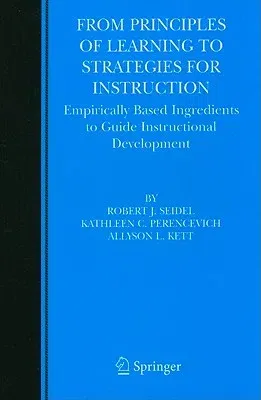Robert J Seidel
(Author)From Principles of Learning to Strategies for Instruction: Empirically Based Ingredients to Guide Instructional DevelopmentPaperback, 29 October 2010

Qty
1
Turbo
Ships in 2 - 3 days
In Stock
Free Delivery
Cash on Delivery
15 Days
Free Returns
Secure Checkout
Print Length
230 pages
Language
English
Publisher
Springer
Date Published
29 Oct 2010
ISBN-10
1441936327
ISBN-13
9781441936325
Description
Product Details
Book Format:
Paperback
Country of Origin:
NL
Date Published:
29 October 2010
Dimensions:
23.62 x
15.49 x
1.52 cm
ISBN-10:
1441936327
ISBN-13:
9781441936325
Language:
English
Location:
New York, NY
Pages:
230
Publisher:
Weight:
399.16 gm

